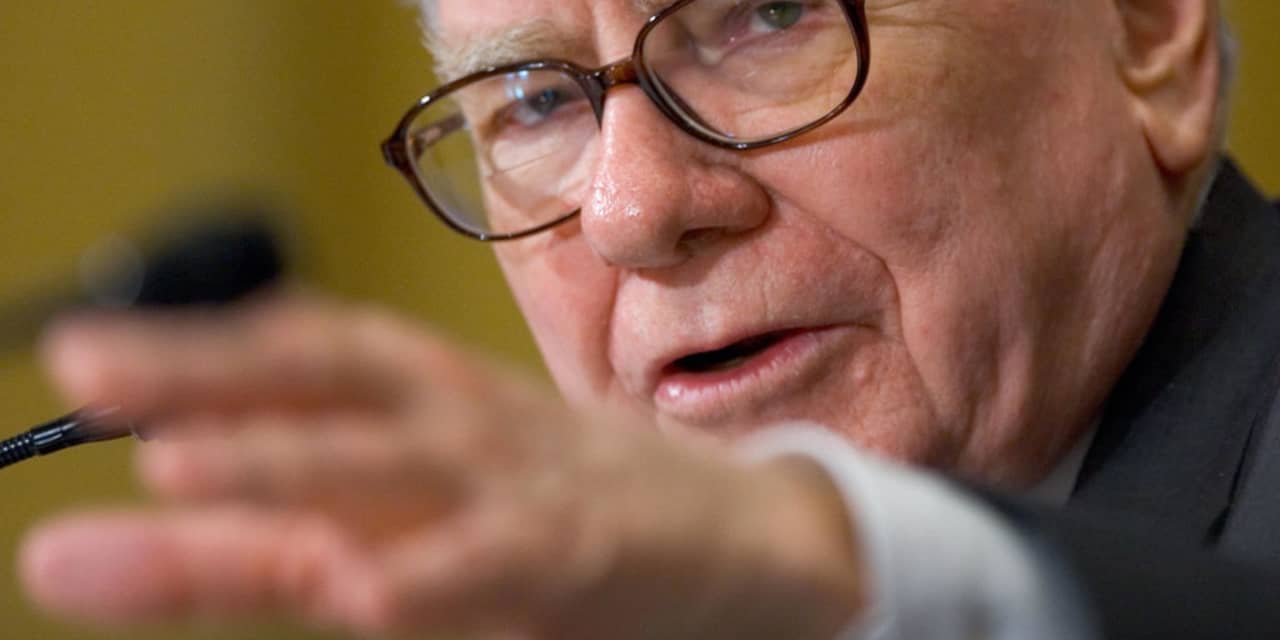The rally in
Berkshire Hathaway
stock this year could stall after the company’s fourth-quarter earnings report released on Saturday.
The results beat expectations: Operating earnings per Class A share rose 30% to $5,881 in the fourth quarter, about 3% above the
FactSet
consensus. But the beat was smaller than in the third quarter, when earnings topped expectations by nearly 15%.
Profits were lower in the fourth quarter at two of Berkshire’s key divisions—Burlington Northern Santa Fe Railway, a freight transportation company, and Berkshire Hathaway Energy, which operates a group of electric utilities, natural gas pipelines, and a real estate brokerage business.
Berkshire CEO Warren Buffett, 93, discussed the disappointing results in 2023 for both divisions in his annual shareholder letter. He cited higher labor costs at BNSF and wildfire losses at BHE’s western utilities.
“Berkshire might need to have delivered much stronger than expected results to keep momentum going,” said Jim Shanahan, an analyst at Edward Jones who has a Hold rating on the stock.
Buffett doesn’t appear to view Berkshire stock as particularly cheap because the company bought back about $600 million of it in the first quarter, through Feb. 12, Barron’s estimated. The estimate is based on a comparison of the shares outstanding on Feb. 12—cited in Berkshire’s 10-K filing with the Securities and Exchange Commission—with the shares outstanding at year-end 2023.
This pace is down from the $2.2 billion repurchased in the fourth quarter. Berkshire paid an average price of about $530,000 per Class A share in the fourth quarter, according to the filing.
That’s considerably below Berkshire’s closing price of $628,930 for the Class A shares on Friday, when the stock hit another record high. Berkshire’s Class A stock is up 16% this year while the Class B shares, which ended Friday at $417.22, have risen 17%. The total return for the S&P 500 is roughly 7%.
Buffett, who determines the level of buybacks at Berkshire, has repeatedly said he is price conscious, noting in his annual letter: “All stock repurchases should be price-dependent. What is sensible at a discount to business-value becomes stupid if done at a premium.”
It’s possible given the strength in the stock that buybacks total $1 billion or less in the current period.
Berkshire stock is now trading at 1.6 times Barron’s calculation of the company’s year-end 2023 book value of about $389,000 per Class A share, a premium to the average of about 1.4 times in the past five years. Berkshire also trades for about 24 times projected 2024 earnings, a premium to the S&P 500.
The Berkshire equity portfolio, which had a strong fourth quarter on gains in
Apple
and other stocks, appears to be little changed overall this year and behind the S&P 500. Apple, the largest holding at nearly 50% of Berkshire’s portfolio of more than $350 billion, is down 5%. Gains in the portfolio lift Berkshire’s book value, which occurred in the fourth quarter.
Berkshire is sitting on $167.7 billion in cash, a record, and Buffett doesn’t appear to see much opportunity for deploying it. Stocks are at record levels and Berkshire was a net seller of $24 billion equities—sales less purchases—last year. Buying large public companies isn’t easy, and there are a limited number of big private ones.
Berkshire completed its purchase of truck-stop operator Pilot Travel Centers in January, paying $2.6 billion for the remaining 20% stake, after buying 80% from the Haslam family for about $11 billion in two stages in 2017 and 2023.
Shanahan wondered if there is any big public company that is willing to sell—and at a price that a discriminating Buffett would accept. And Berkshire doesn’t participate in corporate auctions—a problem for corporate boards seeking the best price for their companies.
Strategic buyers could outbid Berkshire in an auction. Berkshire has made no major acquisition since BNSF about 15 years ago and the one large deal in the past decade—the purchase of Precision Castparts for $37 billion reached in 2015—has been a loser for Berkshire.
Buffett threw a wet blanket on the idea that Berkshire might buy
Occidental Petroleum,
in which it owns nearly 30%. In his letter, Buffett restated that Berkshire doesn’t want to own the entire company.
Shanahan said he is concerned about the wildfire liability related to fires in 2020 and 2022 in California and Oregon, where Berkshire’s PacifiCorp utility unit operates. Buffett cited the risk in his annual letter. Shanahan thinks the wildfire liability could depress earnings for several years. Berkshire has reserved $2.4 billion for the risk, but said the ultimate cost could be higher given adverse court cases.
“It is reasonably possible PacifiCorp will incur significant additional Wildfire losses beyond the amounts currently accrued,” Berkshire wrote in its 10-K.
Berkshire’s Geico auto insurance business had a strong quarter of underwriting results as its turnaround continued, but other parts of the company’s insurance operations had underwriting losses in the fourth quarter.
Geico had an underwriting profit of $1.3 billion in the fourth quarter and $3.6 billion for the year. That reflected sharp increases in premiums—along with the rest of the industry—of about 17% in 2023, but Geico’s policies in force fell by around 10% last year. The company continues to shed market share to its better managed rival, Progressive.
Write to Andrew Bary at [email protected]
Read the full article here




